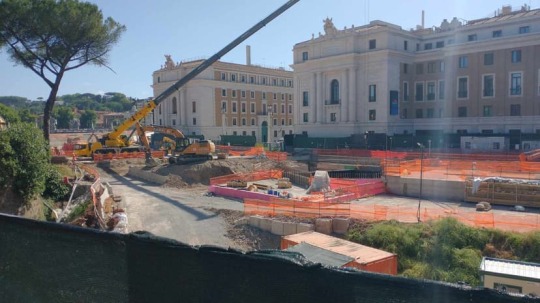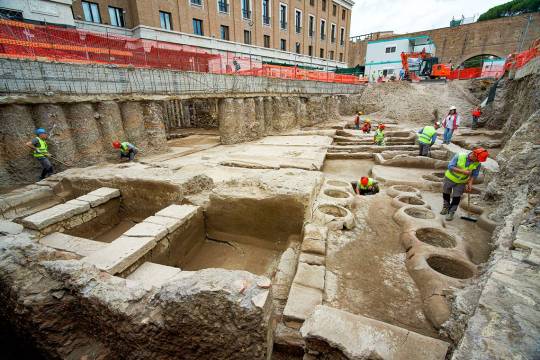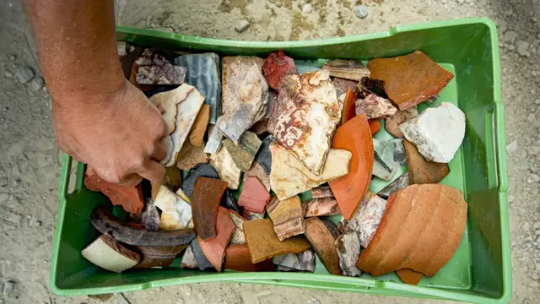#imperial residence
Explore tagged Tumblr posts
Text

Ancient Roman Laundry Uncovered Near the Vatican in Italy
1,700-year-old laundry tubs and tiled floors were discovered by construction workers.
Construction workers in Italy recently came across the site of an ancient laundry near the Vatican, officials say.
Italy's Ministry of Culture announced the surprising findings in a press release on June 14. The discovery was made during construction efforts at Piazza Pia, a Roman square that Italian officials are "pedestrianizing."
Pictures of the site show archaeologists uncovering ancient tiled floors several feet below ground level. Tubs, which were used to clean dirty clothes, were also found at the site.
Excavators also uncovered what appear to be ceramic shards from destroyed artifacts. Officials also discovered pits, which may have once been used as baths.



In a statement, Italian officials said that the site was likely built to be an imperial residence. The housing would have overlooked the Tiber River "in a scenic way with arcades, walks and gardens," officials described.
Between the second and third centuries, the site became a fullonica – or a laundry.
According to the World History Encyclopedia, launderers in ancient Rome used human and animal urine as detergent. They often collected urine – which contains ammonia – from public restrooms.
"The urine was poured into a vat with the clothing and the fullers (or their slaves) would tread on the cloth, agitating it the way a modern-day washing machine does, to remove stains and odors," the World History Encyclopedia's website reads.




"This profession continued, operating in the same way with the same cleaning agents, for hundreds of years after the fall of the Roman Empire and up into the modern age when soap replaced urine."
Romans would bring their dirty laundry to a fullonica and pay to have it cleaned. Even though citizens generally looked down on launderers for their unhygienic washing methods, launderers were paid very well.
In a statement, Archbishop Rino Fisichella said that the recent discovery of the fullonica "brought [him] back in time."
"This part of Rome will again be made visible to all, and as a citizen I can only express a sense of deep gratitude," he said. "[The laundry room] was the meeting place of the people, the people, the women of the era."
By Andrea Vacchiano.
#Ancient Roman Laundry Uncovered Near the Vatican in Italy#Piazza Pia#imperial residence#ancient artifacts#archeology#archeolgst#history#history news#ancient history#ancient culture#ancient civilizations#ancient rome#roman history#roman empire#ancient mosaics#ancient tiles
86 notes
·
View notes
Text
Closely connected to the act of name signing was the act of writing poems on walls. As scholars have already pointed out, with beginnings traceable to the Six Dynasties, wall poems (tibishi) were already very widespread during the Tang. By Christopher Nugent's count, well over one thousand entries in the Complete Tang Poems had titles indicating that they began as inscriptions on some surface other than paper or scrolls. These surfaces included walls at places of gathering and transit, such as post stations, scenic sites, inns, and increasingly in the latter part of the Tang, Buddhist temples, which also served public roles for lay gatherings and performances. (100)
In one anecdote, a latecomer casts aspersions on a first writer's literary skills, comparing him to the general Xiang Yu (232-202 BCE), who was infamous for having learned just enough writing to manage his name: "Li Tang signed his name on a pavilion in Zhaoying County. When Wei Zhan [jinshi degree 865] saw it, he took a brush and dashed off a taunt: 'The rivers of Wei and Qin brighten the eyes, / but why is Xiren short on poetic spirit? / Perhaps he mastered only what Beauty Yu's husband could / learning to write just enough to put down his name.' " ... It would not be a stretch to imagine the sniggering of those who read this inscription in a frequented pavilion. (102)
For a degree seeker in Chang'an, these circuits of information and judgment received more discussion than the actual examination itself. Tang literati wrote copiously about activities such as name signing, public exposure, and triumph. It would not be an exaggeration to say that in ninth-century temples and popular recreation areas, the vertical spaces were teeming with verses that clamored for attention. (104)
selections on poetic graffiti from linda rui feng's city of marvel and transformation: chang'an and narratives of experience in tang dynasty china (university of hawaii press, 2015)
#china#tang dynasty#tagamemnon#<- couldn't stop thinking about graffiti from pompeii while reading this chapter so i suspect it may be of interest to rome-heads in genera#this was very promising book that felt like it failed to fully deliver - can't tell if the author was trying not to get into aspects which-#-have a paucity of surviving sources or if perhaps she was trying to avoid stepping on the toes of existing scholarship#e.g. nugent's mentioned book on poetry production/circulation or juduth zeitlin's article on wall poems and anxieties of loss#but even though i felt like it needed another 50-100 pages of fleshing out there are some generally remarkable moments in here#bits that can be put in remarkable parallel with imperial rome certainly; more fascinatingly with 19th- and early 20th-century fiction-#-that deals closely with 'new' modern urban life. where the forms & patterns of the city itself collude with residents against the newcomer#some interesting notes on bai juyi in here too. though i don't know if they're news to any real bai juyi stans out there
39 notes
·
View notes
Text

Tsarskoye Selo, Russian Imperial Residence in Saint Petersburg, RUSSIA
#tsarskoye selo#russian#imperial#residence#residencia#ruso#saint petersburg#san petersburgo#russia#rusia#europe#europa
56 notes
·
View notes
Text
Athoek Station my beloved . . .
#i'm sludge today i don't have any coherent thoughts#i just love Station SO MUCH#it's trying so hard to protect its residents!! it's doing its best!!#the way that AIs in these books are so much about love#(and the way that love is inherently so much about grief)#UGH!!!#imperial radch
34 notes
·
View notes
Text

Cité pourpre ~ Cité imperiale ~ Huế
#culture#performing arts#residence#theater#theatre#vietnam#opera#Huế#cité impériale#Cité pourpre#imperial city
5 notes
·
View notes
Photo

Weeping Cherry blossom tree at the Site of Konoe Residence in the Kyoto Imperial Palace grounds, Kyoto-Japan.
#Hanami#Japan#Kyoto#Kyoto Imperial Palace#Photography#Sakura#Shidare zakura#Site of Konoe Residence#Weeping Cherry blossom#matsuri#shidarezakura#しだれ桜#京都御所#桜#花見#近衛邸跡
15 notes
·
View notes
Text
okay i am still working on that henry percy write-up but another angle i wish was explored more:
very few allow for the possibility that chapuys was exaggerating jane’s support of mary as heir to the throne to the extent he was because he’s gone beyond and arguably to some extent, even against charles’ advice/instruction in his support of jane and active role in the boleyn downfall, over any princess charles wanted him to wed when it became clear there would be a new english queen (consort)....
of course he’s lost face regardless, but the solution to minimize that (basically, for promising different outcomes than resulted and overestimating jane’s influence on henry and the power that would be hers once queen) might have been to repeatedly insist that jane was vehemently attempting intercession for mary and even to reinstate her as heir, but that henry was dead-set against this, and of course, nobody could ever have predicted this (it was within the expectations of the ambassador’s role to predict political outcomes, an element where chapuys was more often than not, an abysmal failure, particularly wrt this timeline)
aside from the one report of the bishop of faenza ( she has five times thrown herself publicly at the King's feet, requesting him to send for his daughter and declare her Princess), who was not the most reliable source of the tudor court, this is not corroborated by any other contemporary source beyond a report that mary sat at the king and queen’s table for meals (much later), and the later spanish chronicle. chapuys’ own eventual face-to-face meeting with jane preceding mary’s capitulation contained commitment from her that was soon interrupted by henry, although of course chapuys attempts to spin this as best he can and save face later when events plummet soon after:
the satisfaction of this people with the marriage was incredible, especially at the restoration of the Princess to the King's favor and to her former condition [...] begged her to favor her interests; which she said she would do [...] I begged him the day before, when he spoke about it, to take care that it did not contain anything which could directly or indirectly touch her right, or the honor either of herself or of the late Queen, her mother, nor yet her conscience; otherwise she would not consent thereto for all the gold in the world [...] Meanwhile I went to talk with this Queen's brother, whom I left very well informed of the great good it would be, not only to the Queen his sister and all their kin, but also to the realm and all Christendom likewise, if the Princess were restored to her rights; and I am sure he will use his good offices therein. [...] the King got into a great anger against the obstinacy and disobedience of the said Princess, showing clearly that he bore her very little love or goodwill [...] In this case it would be important for the Princess to be declared heiress, at least in case of no male heirs. Has some hopes of this from the demonstration lately made by the King, the Queen's goodwill to her, and the words of Cromwell. [...] it was proposed to deprive the Bastard and make [Mary] heiress [...] the matter proceeded so far that, in spite of the prayers of this Queen, which he rudely repulsed, the King called the judges to proceed according to law to the inquest and first sentence which is given in the absence of the parties [...] I even sent to [Cromwell] several times, when matters were so desperate, to advise the Princess to consent to the King's will, and I have since fully assured him that he should know before two months were over that there was no man in the world who had done better service in this matter than I. / the danger of interrupting our negociations for amity, in which the English proceed so coldly that I know not what to say / The ambassador writes that she was a maid of the late Queen, and afterwards of Anne Boleyn; that she is virtuous and kindly and welldisposed to the Princess, in whose favor she has spoken to the King, and that there were hopes of her being declared true heir in the parliament. / They have also renewed and aggravated the statutes against those who should use the name of Pope, which is also treason; and it is said they will cause the whole realm to be sworn again, in confirmation of the statutes against the Holy See, against the marriage of the late good Queen and the legitimacy of the Princess, to whom no one should dare give that title on pain of his life. / [...] doubted whether he should have any child by the Queen; for which reason he intended, in a few days, to declare the Princess heir of the kingdom / I think the Princess has acted more prudently, whatever Count Cifuentes and Doctor Ortiz may say, who in my opinion have not considered all the circumstances. / The Princess is well. Since her reconciliation to her father, she has been treated even with more ceremony than in times past. / As to the Princess, Cromwell tells me she will be declared heiress apparent without fail. / She is now served as Princess. / Chapuis writes on Sept. 2 that the Princess is well, and is served as Princess.
jane either over-promised or chapuys exaggerated the vehemence of her promise (he certainly did cromwell’s... ‘without fail’ indeed); edward it seems made no commitment at all (none chapuys reports, at least...) and yet he is ‘sure’ he will do his utmost to restore her to her rights.
the question becomes, what corroborating evidence do we have of chapuys’ reports on this dynamic as he reported? really it’s only mary’s letter to jane, which seems to be in response to a letter of support jane only wrote and sent after mary’s submission/capitulation (the copy of which has not, frustratingly, survived, although mary quotes it partially-- “no less full of motherly joy for my towardness of reconciliation than of most prudent counsel for my further proceeding therein"-- although it seems like jane was only able to keep one promise-- “of your goodness you promise to travel to bring to a perfection” was kept, but her request to “have in remembrance her desire to attain the King's presence” after the initial visit was not met for another five months-- “the delay of the coronation will do no harm except that the coming of the Princess to Court is put off till it takes place”).
#his advice to mary being connected on a promise elizabeth would be demoted and mary would be confirmed heir by parliament... woof#there's also quite a gap between the reconciliation and mary being received at court#this has been attributed to the plague but it's like...it's not as if she went with them to dover...#chapuys attempts to save face by saying mary has not been invited to court because she won't be until jane is crowned#and then she is. before she's crowned.#i get so much secondhand embarassment reading his dispatches fr like...what DO you know#but yeah so much of this has to be read as an exercise in face-saving#i don't understand why it so seldom is#'received with EVEN more ceremony than in times past'...come tf on?#as in more so than when she was princess and had a huge household in service to her?#she did receive more servants than she had in elizabeth's residences before#but it was definitely still a huge reduction from 'past times'#also it's interesting that he never asked this of anne#it would involve recognition of her which i assume was why he wouldn't but#considering he claims she was the primary influence of her ill-treatment...wouldn't the obvious answer be to request him to favor her#in exchange for imperial gratitude?#*and most importantly; the primary influence upon henry#or even to george as he does here (the queen's brother) considering he thought george's influence on anne and the king were pretty great#also smth chapuys never attempts despite speaking with george a handful of times during anne's reign#*to request anne#it seems like he chose cromwell as the conduit to henry with very little effect#at least insofar as promoting/protecting mary's interests went
6 notes
·
View notes
Photo
cosy cosy cosy (un-cosy thoughts below)
performing a complex cultural appropriation calculation atm to determine whether i can get away with tatami mats & a shikibuton in my new flat
if the country of one's ancestors was historically subjugated by a major apac power that then suffered due to interwar japan's imperialist ambitions…imo the answer is yes? it's like two (extremely vague and historically contingent) degrees of cultural separation? and i should buy the tatami mat and also some house slippers from muji?

#i'm 80% joking 20% very interested in decentering the us perspective when it comes to cultural appropriation convos#lowkey sick of the phrase “cultural appropriation” at this point#what i am VERY interested in atm though is how china japan and south korea exert cultural influence and soft power within apac#plus histories of non-western imperialism#and i am patiently awaiting the essay where someone addresses their own fascination/fetishization with japanese aesthetics#and a certain level of ambivalence with that fascination#and perhaps the glaring blindspot when it comes to intra-apac political relations and tensions#and how japanese imperialism has been a significant painful part of still-very-recent chinese history and korean history#and yet the awareness of this does not seem to reside alongside discussion of japanese aesthetics#so how can we think about how other asian countries and cultures relate to each OTHER and each other's cultural production and influence?#also (over-intellectualisation aside)#i really am just looking for a cheap (ish) bed#and all the cheap (ish) bedframes look terrible#so naturally i'm like…what if…no bedframe…???
4K notes
·
View notes
Text
The band Imperial Triumphant sampled The Residents for one of their songs!
Listen to the vocals and it'll be obvious:
youtube
youtube
#please someone recognize how cool this is#imperial triumphant#the residents#music#sampling#black metal#experimental music#Youtube
1 note
·
View note
Link
Residence Inn Weehawken Port Imperial Residence Inn Weehawken Port Imperial takes pride in offering an array of entertainment facilities that are sure to delight and captivate guests of all ages. Whether you're looking to relax, socialize, or simply have a good time, this hotel has you covered. Step into the world of retail therapy with the shops located within the premises. Browse through a variety of stores offering fashion, souvenirs, and more. Indulge in a shopping spree and find that perfect item to take home as a memento of your stay. For those seeking a vibrant nightlife, the hotel's bar is the place to be. Sip on expertly crafted cocktails and mingle with fellow guests in a lively and sophisticated atmosphere. Whether you're unwinding after a long day of exploring or looking to kick-start your evening, the bar promises an unforgettable experience. Escape to the hotel's serene garden and immerse yourself in nature's beauty. Take a leisurely stroll, find a cozy spot to read...
0 notes
Text
Imperial Living: DLF Residences
Indulge in opulent living at DLF Imperial Residences. Elevate your lifestyle in this prestigious community, where luxury meets sophistication and every detail reflects unparalleled grandeur. Read More :-
0 notes
Text
headcanon that that's where the experimental b-wings ended up
so...what do we think of omega leading a squadron of experimental fighters and insanely overqualified pilots and it being a mirror of clone force 99
(it's called havoc squadron btw and when they get called in their entrances are exactly like the bad batch's entrance in tcw s7)
(they start out as a squad of pilots but they're eventually a spec ops squad due to previously mentioned overqualifications)
(the other members may or may not be mox, deke, and stak and they occassionally get help from a "liberator of ancient wonders" named lyana hazard and a scientist named emerie karr)
(this concept may or may not be my next fic...)
#star wars#tbb omega#can bayrn (the little jedi yeti baby) be their resident jedi?#also yeah where did the super op b wings go#i think theres a b wing squad later but not star-destroyer-destroying level#animated tales of the rebellion or something showing that omega was actually in all the big ot battles#just on like. the other side of the death star#she was piloting a b wing taking out imperial reinforcements w hera#every time she gets close to where luke is the camera cuts away lol#reblogs
64 notes
·
View notes
Text

Kyoto Imperial Park
#pedestrian#traveller#site of katsuranomiya residence#kyoto imperial park#impermanent#kyoto#moss#japan
0 notes
Text
was thinking about this

To be in "public", you must be a consumer or a laborer.
About control of peoples' movement in space/place. Since the beginning.
"Vagrancy" of 1830s-onward Britain, people criminalized for being outside without being a laborer.
Breaking laws resulted in being sentenced to coerced debtor/convict labor. Coinciding with the 1830-ish climax of the Industrial Revolution and the land enclosure acts, the "Workhouse Act" aka "Poor Law Amendment Act of 1834" forced poor people to work for a minimum number of hours every day. The major expansion of the "Vagrancy Act" of 1838 made "joblessness" a crime and enhanced its punishment. (Coincidentally, the law's date of royal assent was 27 July 1838, just 5 days before the British government was scheduled to allow fuller emancipation of its technical legal abolition of slavery in the British Caribbean on 1 August 1838.)
---
"Vagrancy" of 1860s-onward United States, people criminalized for being outside while Black.
Widespread emancipation after slavery abolition in 1865 rapidly followed by the outlawing of loitering which de facto outlawed existing as Black in public. Inability to afford fines results in being sentenced to forced labor by working on chain gangs or prisons farms, some built atop plantations.
---
"Vagrancy" of 1870s-onward across empires, people criminalized for being outside while being "foreign" and also being poor generally.
Especially from 1880-ish to 1918-ish, this was an age of widespread mass movement of peoples due to the land dispossession, poverty, and famine induced by global colonial extraction and "market expansion" (Scramble for Africa, US "American West", nation-building, conquering "frontiers"), as agricultural "revolutions" of imperial monoculture cash crop extraction resulted in ecological degradation, and as major imperial infrastructure building projects required a lot of vulnerable "mobile" labor. This coincides with and is facilitated by new railroad networks and telegraphs, leading to imperial implementation or expansion of identity documents, strict work contracts, passports, immigration surveillance, and border checkpoints.
All of this in just a few short years: In 1877, British administrators in India develop what would become the Henry Classification System of taking and keeping fingerprints for use in binding colonial Indians to legal contracts. That same year during the 1877 Great Railroad Strike, and in response to white anxiety about Black residents coming to the city during Great Migration, Chicago's policing institutions exponentially expand surveillance and pioneer "intelligence card" registers for tracking labor union organizing and Black movement, as Chicago's experiments become adopted by US military and expanded nationwide, later used by US forces monitoring dissent in colonial Philippines and Cuba. Japan based its 1880 Penal Code anti-vagrancy statutes on French models, and introduced "koseki" register to track poor/vagrant domestic citizens as Tokyo's Governor Matsuda segregates classes, and the nation introduces "modern police forces". In 1882, the United States passes the Chinese Exclusion Act. In 1884, the Ottoman government enacts major "Passport Nizamnamesi" legislation requiring passports. In 1885, the racist expulsion of the "Tacoma riot".
Punished for being Algerian in France. Punished for being Chinese in San Francisco. Punished for being Korean in Japan. Punished for crossing Ottoman borders without correct paperwork. Arrested for whatever, then sent to do convict labor. A poor person in the Punjab, starving during a catastrophic famine, might be coerced into a work contract by British authorities. They will have to travel, shipped off to build a railroad. But now they have to work. Now they are bound. They will be punished for being Punjabi and trying to walk away from Britain's tea plantations in Assam or Britain's rubber plantations in Malaya.
Mobility and confinement, the empire manipulates each.
---
"Vagrancy" amidst all of this, people also criminalized for being outside while "unsightly" and merely even superficially appearing to be poor. San Francisco introduced the notorious "ugly law" in 1867, making it illegal for "any person, who is diseased, maimed, mutilated or deformed in any way, so as to be an unsightly or disgusting object, to expose himself or herself to public view". Today, if you walk into a building looking a little "weird" (poor, Black, ill, disabled, etc.), you are given seething spiteful glares and asked to leave. De facto criminalized for simply going for a stroll without downloading the coffee shop's exclusive menu app.
Too ill, too poor, too exhausted, too indebted to move, you are trapped. Physical barriers (borders), legal barriers (identity documents), financial barriers (debt). "Vagrancy" everywhere in the United States, a combination of all of the above. "Vagrancy" since at least early nineteenth century Europe. About the control of movement through and access to space/place. Concretizing and weaponizing caste, corralling people, anchoring them in place, extracting their wealth and labor.
You are permitted to exist only as a paying customer or an employee.
#get to work or else you will be put to work#sorry#intimacies of four continents#tidalectics#abolition
2K notes
·
View notes
Photo

Weeping Cherry blossom tree at the Site of Konoe Residence in the Kyoto Imperial Palace grounds, Kyoto-Japan.
#Hanami#Japan#Kyoto#Kyoto Imperial Palace#Photography#Sakura#Shidare zakura#Site of Konoe Residence#Weeping Cherry blossom#matsuri#shidarezakura#しだれ桜#京都御所#桜#花見#近衛邸跡
7 notes
·
View notes